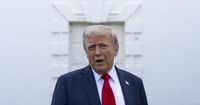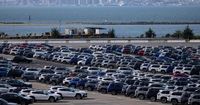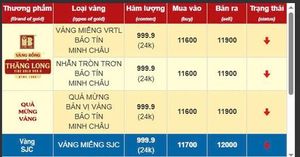As the automotive industry braces for impending tariffs, President Donald Trump is reportedly considering exemptions for carmakers from some of the tariffs his administration has imposed. This potential relief comes ahead of a crucial deadline on May 3, 2025, which has sparked concern among global car manufacturers.
According to a report by the Financial Times, the Trump administration is weighing the option of exempting car parts from tariffs levied on imports from China. These tariffs were originally implemented to combat the production of fentanyl, a powerful synthetic opioid that has contributed to the ongoing opioid crisis in the United States. The proposal also includes allowing parts manufacturers to avoid tariffs on steel and aluminum, a practice referred to as "destacking," which aims to alleviate some of the financial burdens on the automotive sector.
Despite these potential exemptions, a 25% tariff on all foreign-made cars will remain in effect, as will a similar 25% tariff on car parts scheduled to take effect on the same date. This dual-layer of tariffs has raised alarm bells among automotive executives, who argue that the cumulative effect of these tariffs could severely impact production costs and profitability.
General Motors Co., Ford Motor Co., and Stellantis have already seen fluctuations in their stock prices in response to the news. After-hours trading indicated a rise of 6.1% for GM, 3% for Ford, and 6.8% for Stellantis. These companies are among those that have been lobbying the Trump administration for tariff relief, emphasizing that the current tariff structure could jeopardize their operational viability.
In a separate statement, President Trump indicated that the 25% tariff imposed on cars imported from Canada could also increase, saying, "When I put tariffs on Canada — they're paying 25% — but that could go up, in terms of cars. All we're doing is we're saying, 'We don't want your cars, in all due respect. We want, really, to make our own cars.'" This statement underscores the administration's ongoing commitment to prioritizing domestic manufacturing over foreign imports.
Industry leaders have expressed their concerns about the upcoming tariffs. General Motors CEO Mary Barra stated, "First of all, I need clarity, and then I need consistency. To make those investments and to be good stewards of our owner's capital, I need to understand what the policy is." This sentiment reflects a broader anxiety within the automotive sector regarding the unpredictability of U.S. trade policy.
Moreover, six major automotive policy groups have united in their efforts to lobby against the impending tariffs on auto parts. They argue that these levies could exacerbate existing financial strains on suppliers and manufacturers, many of whom are already experiencing distress. In a letter to Trump officials, they highlighted that the upcoming tariffs could jeopardize U.S. automotive production and lead to broader industry problems.
As the deadline approaches, the Center for Automotive Research has estimated that the 25% tariffs on automotive imports could escalate costs for automakers by approximately $108 billion in 2025. This staggering figure illustrates the potential economic fallout from the administration's current tariff policies.
In light of these developments, Tesla recently suspended plans to ship components from China for its Cybercab and Semi electric trucks to the United States. This decision was reportedly made in response to the rising tariffs, which have complicated the company's supply chain and production timelines.
Ford also faced challenges due to retaliatory tariffs, halting shipments of some vehicles to China as taxes on imported vehicles soared as high as 150%. These developments highlight the interconnected nature of global trade and the ripple effects of U.S. tariff policies on international markets.
As discussions continue within the Trump administration regarding potential tariff relief, it is clear that the automotive industry is at a critical juncture. The balance between protecting domestic manufacturers and maintaining competitive pricing for consumers is a delicate one, and the decisions made in the coming days will have lasting implications for the industry.
In conclusion, the automotive sector faces a complex landscape as it navigates the potential for tariff exemptions while contending with existing duties that threaten profitability and supply chain stability. With industry leaders advocating for clarity and consistency in trade policy, the coming weeks will be pivotal in shaping the future of U.S. automotive manufacturing.





